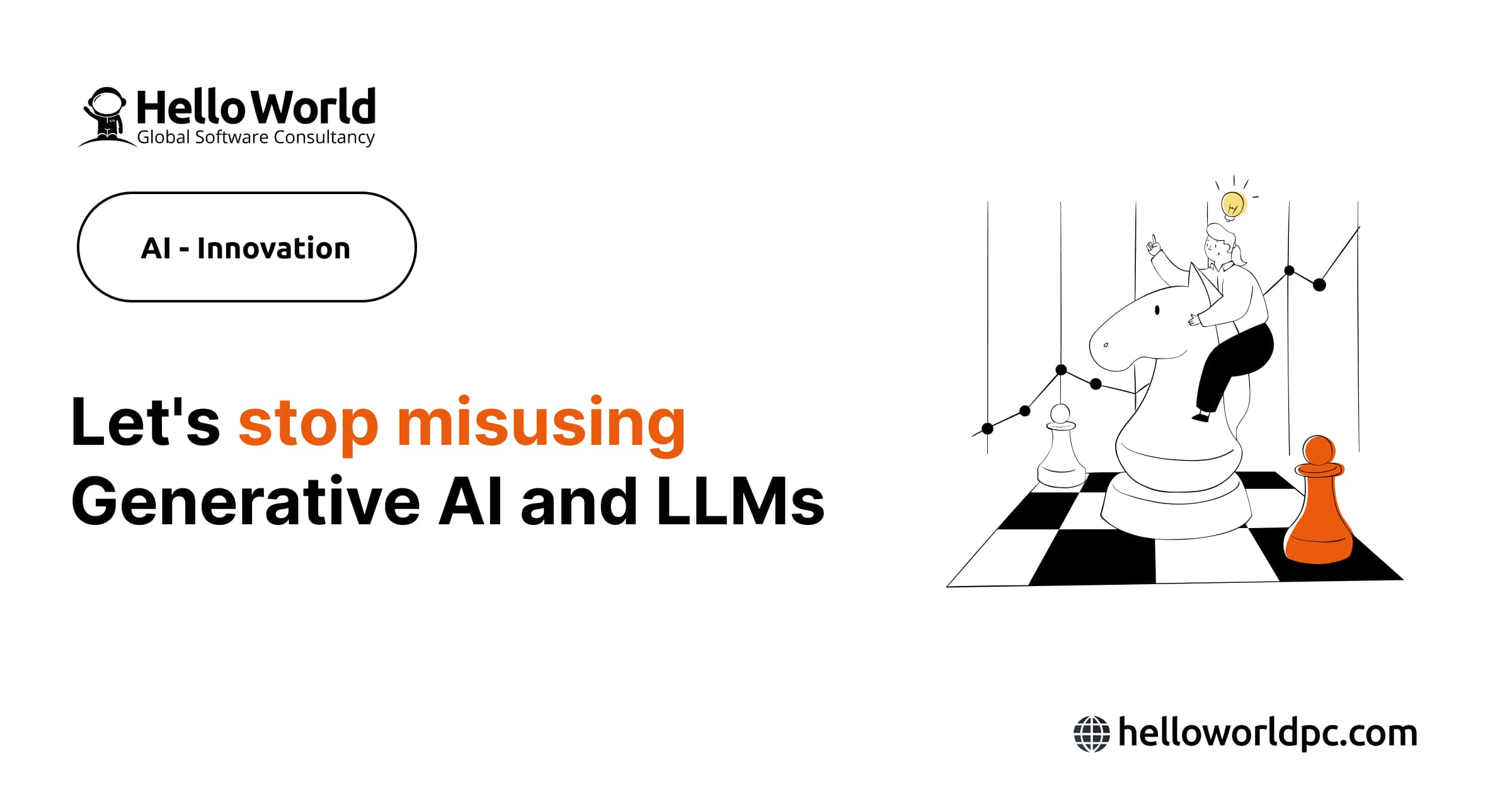Over the last few years, Generative AI and large language models (LLMs) have captured our imagination and opened up a world of possibilities for industries, researchers, and tech enthusiasts. These powerful tools, capable of generating human-like text, images, and even code, have revolutionized how we approach problems in diverse fields. LLMs like GPT-4 have shown incredible versatility, from drafting emails to creating art. Their potential is truly inspiring, but it's important to remember that great power comes with great responsibility.
Let's explore some common misuses of LLMs, illustrating why, despite their brilliance, they are only a remedy for some challenges.
LLMs: A Double-Edged Sword
Large Language Models are designed to understand and generate human-like text based on the data on which they have been trained. This makes them invaluable for tasks such as:
- Content generation: Creating articles, blogs, and even creative writing pieces.
- Language translation: Offering quick translations across multiple languages.
- Customer support: Automating responses in chatbots to handle basic queries.
However, their design also imposes inherent limitations. LLMs are trained on vast datasets and rely on pattern recognition rather than proper understanding. This leads to several pitfalls when they are applied beyond their optimal use cases.
Common Misuses of LLMs
-
Decision-Making in High-Stakes Scenarios: Some organizations have attempted to use LLMs to make critical decisions in areas like finance, healthcare, and law. While LLMs can process and summarize large amounts of information, they lack the nuanced understanding and ethical considerations necessary for high-stakes decision-making. For example, using an LLM to diagnose medical conditions can lead to misinterpretation of symptoms or oversimplified recommendations that need to consider the complexity of human health.
-
Factual Accuracy and Misinformation: LLMs can generate text that sounds authoritative, but they are prone to "hallucinations"—the creation of information that seems plausible but is incorrect. This becomes problematic when LLMs are used in scenarios where factual accuracy is paramount, such as journalism or academic research. Trusting LLMs to produce reliable information without human oversight can lead to the spread of misinformation.
-
Personalized Emotional Support: While LLMs can mimic empathy and provide general advice, they are not a substitute for genuine human interaction, especially in sensitive situations requiring emotional support, such as therapy. The lack of proper understanding and emotional intelligence in LLMs means that they cannot provide the nuanced and compassionate responses needed in mental health care.
-
Creative Originality: LLMs are excellent at generating content that blends existing ideas and styles, but they need help with true originality. When tasked with producing genuinely innovative ideas or groundbreaking art, LLMs often need to catch up, as they can only remix what they've seen before. This makes them less effective in scenarios where originality and out-of-the-box thinking are critical.
Function Calling: Extending the Abilities of LLMs
A recent advancement in LLMs is the integration of function calling, which enables these models to extend their abilities by interfacing with external functions or APIs. Function calling allows LLMs to perform specific tasks that go beyond text generation, such as retrieving real-time data, performing calculations, or interacting with databases.
This feature helps to bridge the gap between LLMs' general-purpose capabilities and the need for precise, context-aware actions. For instance:
- Dynamic Data Retrieval: An LLM can call a function to fetch up-to-date weather information, stock prices, or other real-time data instead of relying on static information from its training set.
- Complex Calculations: By invoking mathematical or logical functions, an LLM can handle more complex problem-solving tasks that require precise calculations or logic.
- Custom Actions: Businesses can define specific functions that an LLM can call to trigger processes, such as booking a meeting, making a purchase, or querying a customer database.
Function calling enhances the practical utility of LLMs, making them more versatile and reliable in scenarios that require real-time information and precise actions. However, it's still crucial to ensure that these functions are designed and used thoughtfully, maintaining human oversight to avoid errors and misuse.
The Right Way to Use LLMs
To harness the power of LLMs effectively, it's crucial to recognize their strengths and limitations. Here are some guidelines:
- Use as a tool, not a decision-maker: LLMs should assist in gathering information and offering suggestions but should not be the final authority in critical decision-making processes.
- Fact-check rigorously: Always verify the output of LLMs with reliable sources, especially when dealing with factual content.
- Combine with human insight: Pair LLMs with human expertise to add the necessary context, ethical considerations, and emotional intelligence that these models lack.
- Create first drafts: Employ LLMs for tasks that benefit from generating variations on existing content, such as brainstorming or first drafts. This is where they truly shine. However, for creating entirely new concepts, they may need some catching up to do.
Conclusion
Generative AI and LLMs are transformative technologies that have opened new doors in automation, content creation, and customer interaction. However, their misuse can lead to significant issues, mainly when applied in contexts that require deep understanding, ethical judgment, or originality. By recognizing the limitations of LLMs and using them appropriately, we can maximize their benefits while avoiding the pitfalls of over-reliance on technology that is not yet—and may never be—a universal solution to all challenges.
In the world of AI, discernment and understanding are just as important as innovation. Let's embrace the power of LLMs with a clear understanding of their role and their limits. Cheers!!

